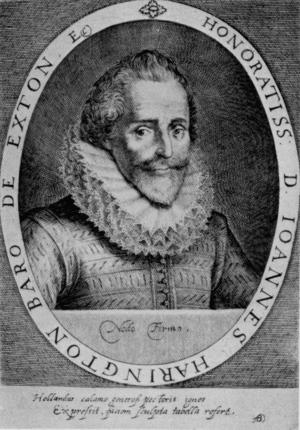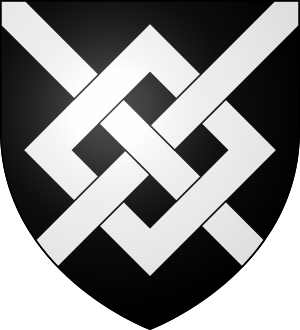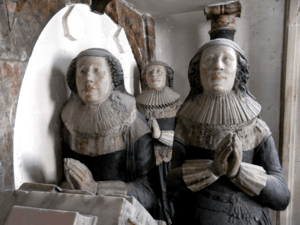John Harington, 1st Baron Harington of Exton facts for kids
John Harington, 1st Baron Harington (born around 1539 or 1540, died August 23, 1613) was an important English courtier and politician. He lived at Exton in Rutland, England. He was known for his service to the English Crown and his connection to the royal family.
Contents
Who Was John Harington?
His Family Background
John Harington was the oldest son of Sir James Harington and Lucy Sidney. His family was very powerful in Rutland during the late 1500s. They owned many large estates.
Early Life and Politics
John Harington studied law in London. In 1571, he became a Member of Parliament (MP) for Rutland. An MP is a person elected to represent an area in the country's government.
He held many important jobs. From 1559 to 1593, he was a Commissioner of the Peace. This meant he helped keep law and order in his area. He also worked for Robert Dudley, a powerful Earl, in the Netherlands.
In 1582, he became the Sheriff of Warwickshire. A Sheriff was a chief law enforcement officer in a county. He was made a knight in 1584.
Serving the Queen and King
John Harington was an MP for Warwickshire in 1586. He even traveled with Mary, Queen of Scots, on her way to Fotheringhay Castle. Later, he was an MP for Rutland again in 1593 and 1601. He also served as Deputy Lieutenant for Rutland and Warwickshire. This role helped organize the local military.
He was in charge of Kenilworth Castle from 1588 to 1590. This was for Ambrose Dudley, the Earl of Warwick. John Harington's daughter, Lucy, later married the Earl of Warwick's nephew.
In 1596, he hosted a play called Titus Andronicus at his home. He also put on a special show called a masque.
Royal Connections and Challenges
In 1603, King James I visited John Harington at his home in Burley. Harington entertained the King with a big dinner and a welcoming speech. The King even used Harington's coach after an injury.
After this visit, King James made John Harington a Baron in July 1603. This was a very high honor. He was then known as Baron Harington of Exton.
He was also chosen to be the guardian of the King's daughter, Princess Elizabeth. Taking care of the Princess was very expensive. It cost John Harington so much money that it almost ruined him financially. To help him, the King gave him permission to make the first copper coins called farthings.
Lord Harington traveled with Princess Elizabeth to Germany when she married. While there, two of his servants got into a fight with another courtier.
A Famous Poem
John Harington wrote a short, two-line poem that is still known today. It says: "Treason doth never prosper; what's the reason?/ For if it prosper, none dare call it treason." This poem means that if a betrayal or a bad act succeeds, people won't call it "treason" anymore because the person who did it is now in power.
His Later Life and Legacy
John Harington died in Worms, Germany, in 1613, while on his way home. After he died, his home at Exton was sold to pay off his debts.
His Family
John Harington married Anne Keilway. They had several children, including:
- John Harington, who became the 2nd Baron Harington of Exton after his father.
- Lucy Harington, who married Edward Russell, the Earl of Bedford.
- Frances Harington, who married Sir Robert Chichester. She was known for dancing at court in a show called The Masque of Beauty in 1608.
 | Chris Smalls |
 | Fred Hampton |
 | Ralph Abernathy |




